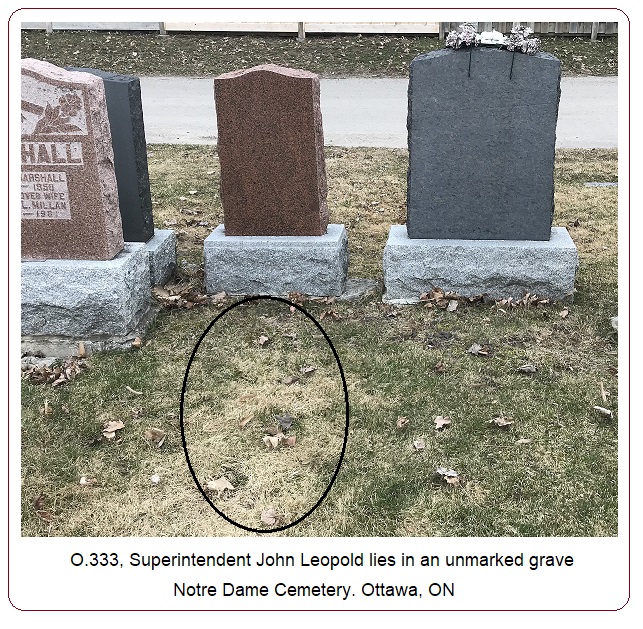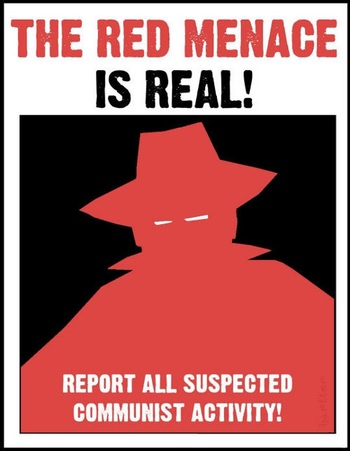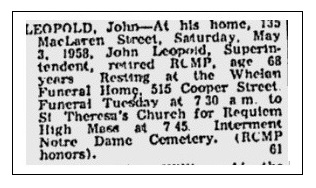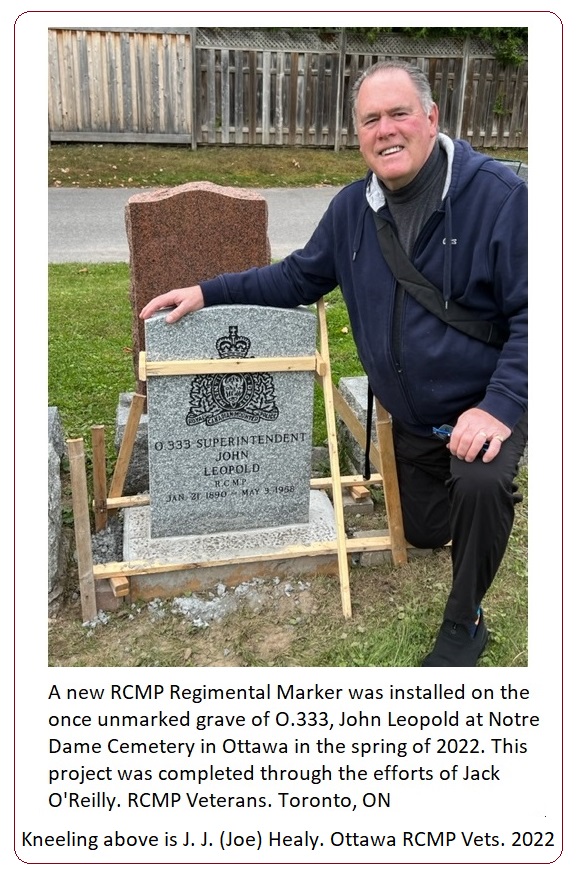True and Fascinating Canadian History

Vet of the Month: April, 2020
O.333, RCMP Superintendent John Leopold
Alias: Mr. Johann Esselwein
RCMP Vets. Ottawa, ON
An Unlikely Officer, A Worthy Spy

This short story is about one of the most unusual careers of any RCMP Officer who ever served in Ottawa. This officer led a very unique police career filled with mystery, danger and suspense. It is the story of RCMP Officer O.333, long deceased Superintendent John Johann Leopold who was better known in the press and to the public by his undercover alias: Mr Johann Esselwein.
John Leopold was born in Czechoslovakia in 1890. He was a single man, and from all reports he left his parents and his siblings behind when he immigrated to Canada in 1912. Upon arriving in Canada, Leopold first moved to Alberta where he eked out a living performing hard physical labour to survive. He recognized that he needed a change away from the farming lifestyle. Leopold also sought adventure.
It was the fall of 1918 and World War One was still raging. Leopold had the notion that he wanted to go overseas and he sought a means to do so. On September 26th, 1918, he joined the Royal North West Mounted Police (RNWMP). The RNWMP sent men to Siberia, France and Flanders. Leopold was an unusually short man at 5' 4" and this distinguishing feature would normally have made him unsuitable for the police profession due to the height regulations at that time. However, Leopold's short stature was not a barrier to the RCMP -- he was in fact an excellent candidate for undercover operations. What made Leopold a remarkable asset, aside from his height, was his ability to speak several languages; Czech, German, Polish, Ukrainian and English.

While his physique may have made Leopold an unlikely person to become a ‘constable on patrol’, he was the perfect man for a dangerous job which the RCMP had in mind. Constable Leopold underwent the challenges of Basic Recruit Training at 'Depot' Division in Regina, but immediately afterwards he was recruited for a very sensitive domestic policing duty. He skipped the ‘general duties’ of a newly trained police officer and was rerouted directly into a highly secretive police operation -- Canada's own fight against communist. Canada was very aware that communism posed a threat to democracy. Political leaders from all allied countries feared the spread of communism. The events in Russia caused heightened security and scrutiny in Western countries - Canada included.
The RNWMP assigned Leopold the very difficult task of infiltrating the Communist Party and reporting back the inside operations and goals of the Party. Leopold was very convincing as a devoted Communist and rose in the Party to become a senior member as Secretary. While he was operating undercover, he endured harsh criticism by the unsuspecting press for working and associating with the Communist Party. Yet all the while he was collecting evidence: photographs, sketches and written plans that would be used to help the prosecution in later court cases. After seven years of undercover, Leopold wrapped up this secret operation. Several suspects associated with the Communist Party, including its leaders, were arrested, prosecuted and convicted.
There can be no doubt that Leopold's career as an effective undercover police officer was one of dedication and sacrifice. His was a life of secrecy, which brought with it enormous stress. He lived with the constant threat of exposure and was very much alone in his role.

After the trials of the communist suspects, Leopold was allowed to return to normal police operations. He was promoted to Sergeant and transferred to Canada's northland. Three years later, he was transferred back to Ottawa where he helped to create and build the new RCMP Intelligence Branch. It was here where he remained for several years. Leopold was promoted to Sub Inspector in 1942 and two years later he was promoted to full Inspector. In 1946, Inspector Leopold represented the RCMP at the Royal Commission on Espionage. It was reported that his insight and general knowledge of the topic of espionage was exceptional and helpful in the formation of Canadian foreign policy. In 1951, Leopold was promoted to Superintendent, and on November 20th, 1952 he retired from the RCMP to live in Ottawa.
While many stories have been written about the exploits of Superintendent Leopold, unfortunately much of his undercover work and Canada's fight against communism remain top secret even to this day. In his obituary which can be found in the RCMP journal The Quarterly, the author gave praise to John Leopold's police work. The author said, "...while the surface ingredients of his career are generally known, the details of his activities in the work on which he was engaged may never be told. It is sufficient to say perhaps that his knowledge of the forces engaged in the task of weakening our democratic structure was greater than any other Canadian."(p. 27). Leopold had hoped for real adventure, and when he joined the Force he found himself in the midst of it.
Upon the announcement of his retirement, the local press praised Leopold. The press wrote, "he neither looked like a Mountie nor an undercover agent." (p. 27). The press also recognized the seriousness, and merits of his undercover work and the untold dangers which he must have faced over the span of seven years while working so closely within the Communist Party.
Superintendent Leopold died at the age of 68 only a few years after his retirement. Leopold lived his whole life mostly alone and in loneliness due to the secretive nature of his work. He had no family. The lifeless body of Superintendent Leopold was found in his Ottawa apartment on May 5, 1958. Although he had retired from the Force, Superintendent Leopold was given a RCMP Red Serge funeral by his former colleagues and lifelong friends.

His career was like no other RCMP Officer. With him also died a life of dedication against the spread of Communism in Canada. In a fitting farewell to this most unusual police officer, the Ottawa press stated, "There are brave men whose acts of courage are done in secret and who receive no rewards in medals of acclaim. Superintendent Leopold was one of them and today, when his death recalls the fraction of his achievement which was known, we honor the memory of a good man who was a proud servant of the land of his adoption." (p. 27). On behalf of all Canadians, the press recognized that John Leopold had many personal sacrifices to protect our national values of freedom and democracy.
In April 2020, Toronto RCMP Veteran Jack O'Reilly found the obituary for Superintendent Leopold that had been published in The Ottawa Citizen in 1958. The obituary said that he was buried in Notre Dame Cemetery. With the assistance of cemetery administrators I was successful in finding his grave. It is sad to say that John Leopold presently lies in an unmarked grave, but now that his final resting place has been discovered, Ottawa Veterans have plans in the Spring to mount an RCMP marker on his grave. Superintendent Leopold rests in peace with the grateful thanks of Canada, his adopted country. His invaluable service to Canada cannot be fully measured, but his memory will endure today and tomorrow if only briefly in this short story.
The end.
Reporting from Fort Healy,
J. J. Healy
April 16, 2020


RCMP Superintendent John Leopold's full page obituary can be found in The Quarterly. V24(1). July, 1958.







